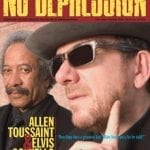Grant McLennan: 1958 to 2006
On May 6, Grant McLennan, age 48, died in his sleep of apparent heart failure. McLennan grew up and lived most all his life in Brisbane, Australia’s third largest city, on the tropical northwestern coast. In the late ’70s he met Robert Forster over tea and scones at Queensland University; the two developed an intense friendship and collaborated as the Go-Betweens for the next three decades, save for a twelve-year hiatus that yielded McLennan’s four underrated solo albums: Watershed, Fireboy, Horsebreaker Star and In Your Bright Ray.
It’s been said that in a just world the Go-Betweens would be a household name, as familiar as their literate pop peers the Smiths. But no, probably not even in utopia would this Australian band provide any kind of mass soundtrack. Their sound is brittle and bright, with tunes more complex than catchy, their rhythms more prickly than danceable, their lyrics more tense and inward than universal.
For a band that built song after song around acoustic guitars (or electric guitars played so quietly they could be unplugged), bass and drums, they sound rootless, nearly immune to the pleasures of R&B, soul or country. Forster and McLennan wrote of love, obsessively and tragically, but (especially in McLennan’s case) with a peculiar adult angst in which memories seemed to lead lives of their own.
To say McLennan was obsessed with melody is like saying Van Gogh was preoccupied with color. His early masterpiece “Cattle And Cane” announced the shape of a tune in tentative, primitive plucks, as if he were afraid of his guitar. “I recall a schoolboy coming home,” McLennan sang, his voice drenched in reverb, “through fields of cane to a house of tin and timber, and in the sky, a rain of falling cinders.” The song didn’t just read like Proust, it sounded and felt that way; as the song unfolds, the melody expands and expands, gliding all the way through the thorny time signature.
On 2005’s Oceans Apart, the band’s final studio album — Forster has said he won’t continue the Go-Betweens without McLennan — the melodies are rich and detailed, and McLennan’s songwriting is tingling with thoughts. On “Finding You” he captured something ineffable about the reasons he, or anyone, really, sings: “What would you do if you turned around and saw me beside you/Not in a dream, but in a song?/Would you float like a phantom or would you sing along?…Don’t know where it’s flowing/But I know it’s finding you.”
On “Boundary Rider”, he strolled back through the Australian landscape, saw his own reflection everywhere, yet didn’t sound haunted. “To know yourself is to be yourself,” he sang, and he sounded genuinely at peace — with himself and the muse of his memories.




